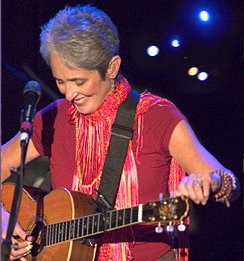 Yes, you read that right. 2007 brings the fiftieth anniversary of Jean Sibelius’ death, and his tone poem Finlandia was written as a protest against Russian influence in Finland at the end of the 19th century. Joan Baez sung her own a cappella version on Michael Moore’s 2004 Slacker’s Uprising Tour, and in anticipation of the composer’s anniversary year On An Overgrown Path has the full story and an audio file in Sibelius – his genius remains unrecognised.
Yes, you read that right. 2007 brings the fiftieth anniversary of Jean Sibelius’ death, and his tone poem Finlandia was written as a protest against Russian influence in Finland at the end of the 19th century. Joan Baez sung her own a cappella version on Michael Moore’s 2004 Slacker’s Uprising Tour, and in anticipation of the composer’s anniversary year On An Overgrown Path has the full story and an audio file in Sibelius – his genius remains unrecognised.
 Our friend Marvin Rosen will be airing the entire 6 hour seven minute version of Morton Feldman’s String Quartet No. 2, by the Flux Quartet, beginning at 11 am, EST on Friday, December 29, as part of a special 9 hour Classical Discoveries program devoted to American contemporary music.
Our friend Marvin Rosen will be airing the entire 6 hour seven minute version of Morton Feldman’s String Quartet No. 2, by the Flux Quartet, beginning at 11 am, EST on Friday, December 29, as part of a special 9 hour Classical Discoveries program devoted to American contemporary music.
Two members of Flux–Tom Chiu and Dave Eggar–will join Marvin to discuss the work after the performance.
I believe it is safe to say that Marvin is the only broadcaster in America who both can and would undertake such a mission.
Classical Discoveries is broadcast via WPRB 103.3 FM in Princeton, NJ. and over the internet here.
The Russian composer Galina Ustvoskaya died yesterday. Alex Ross has the details and the (appropriately) terse, German notice from her publisher, Sikorski.
I don’t have time now to write much about Ustvolskaya’s music, but my encounter with it was one of the determining events of my own musical evolution, and I still can’t quite believe that I performed all six of her piano sonatas spaced out during an all-night new music marathon concert as an undergraduate. (By the time I got to the last of them, round about 4 AM, I was pretty spaced out myself.)
If you don’t have this disc, correct that about yourself. This is the music Shostakovich could have written but didn’t.
Update: WordPress is eating my links for breakfast. Go over to http://www.therestisnoise.com for more details, and the CD you are to buy is Frank Denyer’s recording of the complete piano sonatas on Conifer.(I haven’t heard Oleg Malov’s on Megadisc, a label that has also released several other discs of Ustvolskaya’s hieratic chamber music.)
Well, you’re too late for the $550 Center Parterre Premium seats or the $350 Orchestra Premium seats for tonight’s premiere of Tan Dun’s The First Emperor at the Met but if you hurry it looks like you can still grab one of the bargain $250 orchestra seats. (I have a couple of mere $80 seats in the alpine section later.)
In the meantime, us poor people can read about the Mr. Tan’s opera foo young in the Met blog or perhaps lurk at the stage door for a glimpse of Placido Domingo or Elizabeth Futral or maybe even the great film director Zhang Yimou (To Live, Raise the Red Lantern, Hero, House of Flying Daggers), making his Met debut. Maybe he’s made up with Gong Li. Maybe she’ll be there. Hey, I may go and stand outside myself.
‘Twas the night before Christmas, when all through the city
The critics were trying their best to be witty;
They printed their lists of the past year’s best fare,
In hopes that their trendy young readers would care;
But the readers were nestled all snug in their beds,
While vacuous pop idols danced in their heads;
And the Maestro in PJs, and I in my drawers,
Had just settled in to examine some scores,
When out on the lawn, such cacaphonous sound,
I sprang from my desk thinking Zorn was in town. (more…)
A while back, Stephen Colbert made fun of John Zorn on the Colbert Report, and I’m pleased to report that tonight he referred, if not by name, to La Monte Young. At the beginning of a segment on Art, he talked about feeding hay to a piano, which as you know clearly refers to Young’s 1960 piece “Piano Piece for David Tudor #1.”
The piece is one of several text instruction pieces from 1960 and its instructions read: “Bring a bale of hay and a bucket of water onto the stage for the piano to eat and drink. The performer may then feed the piano or leave it to eat by itself. If the former, the piece is over after the piano has been fed. If the latter, it is over after the piano eats or decides not to.”
Tom Johnson reviewed a September 1973 performance of the piece in The Village Voice, saying “I have always thought of the piece as conceptual art and never expected it to come off in an actual performance, but I discover that I was wrong. The way Jim Burton interprets the score, the piano really starts to look like a horse, and the audience is delighted with the absurdity of the situation. So much for any theories about La Monte Young as a conceptual artist.”
Two questions: Does anybody know of any more recent or upcoming performances? And which piano companies make the hungriest pianos?
Here’s an obituary written by Carson Cooman.
American composer Daniel Pinkham passed away on the morning of December 18, 2006 in Natick, Massachusetts, USA after a brief illness.
Pinkham, one of America’s most active and well-known composers of music for the church, was born in Lynn, Massachusetts, USA on June 5, 1923. He studied at Harvard University and Tanglewood with Walter Piston, Aaron Copland, Samuel Barber, Arthur Honneger, and Nadia Boulanger. As an organist and harpsichord he studied with Wanda Landowska and E. Power Biggs.
For over forty years, Pinkham was music director at Boston’s historic King’s Chapel, where he led one of the premiere church music programs in America. Until his death, he served as senior professor of musicology at the New England Conservatory where he founded their program on early music in the 1950’s.
His catalogue as composer included our symphonies and other works for large ensembles, cantatas and oratorios, concertos and other works for solo instrument and orchestra for piano, piccolo, trumpet, violin, harp and three organ concertos, theatre works and chamber operas, chamber
music, electronic music, and twenty documentary television film scores.
His work has been performed by ensembles ranging from the New York Philharmonic to small parish choirs. He was named Composer of the Year in 1990 by the American Guild of Organists and had been awarded six honorary doctorates.
His final completed composition, “A Cradle Hymn” for mixed choir and string quartet was premiered on December 17th and 18th by the Harvard University Choir in Cambridge, Massachusetts, USA for the 97th Annual Harvard Carol Services.

